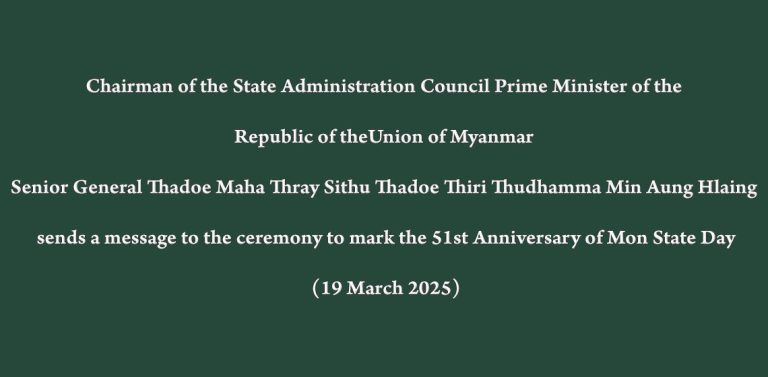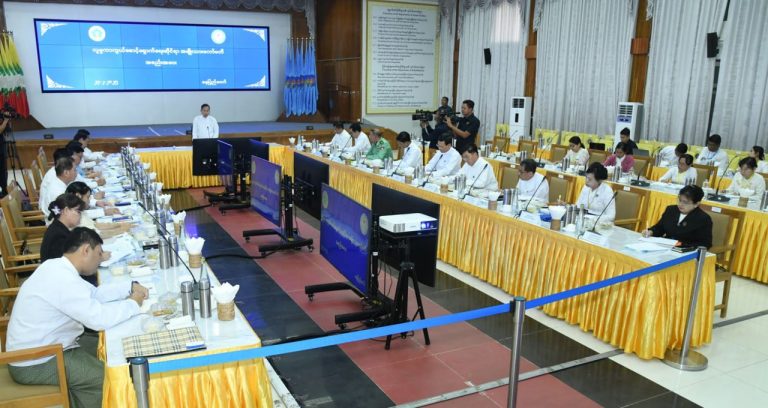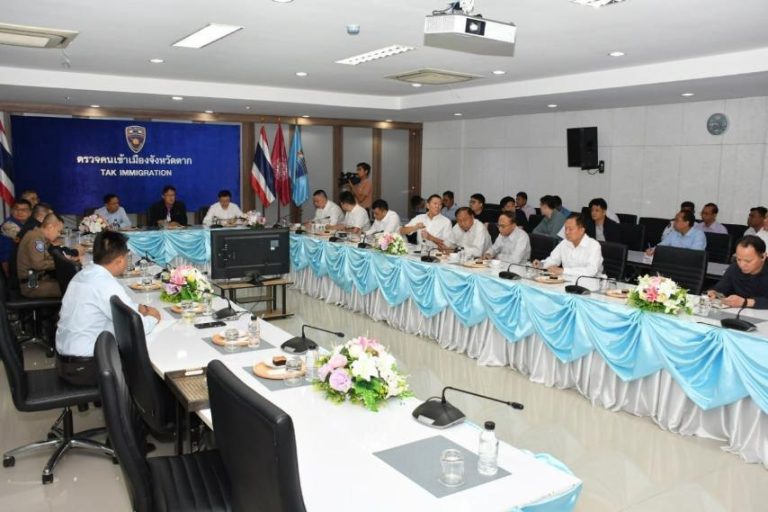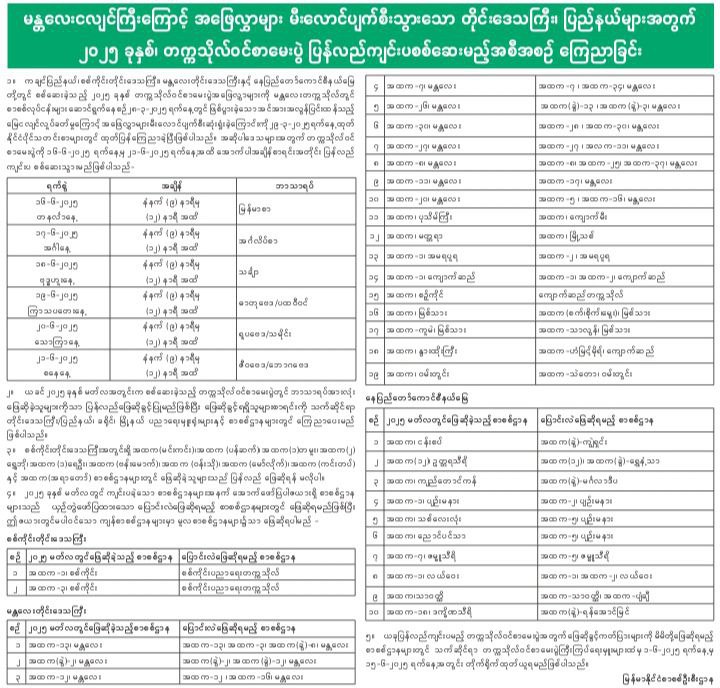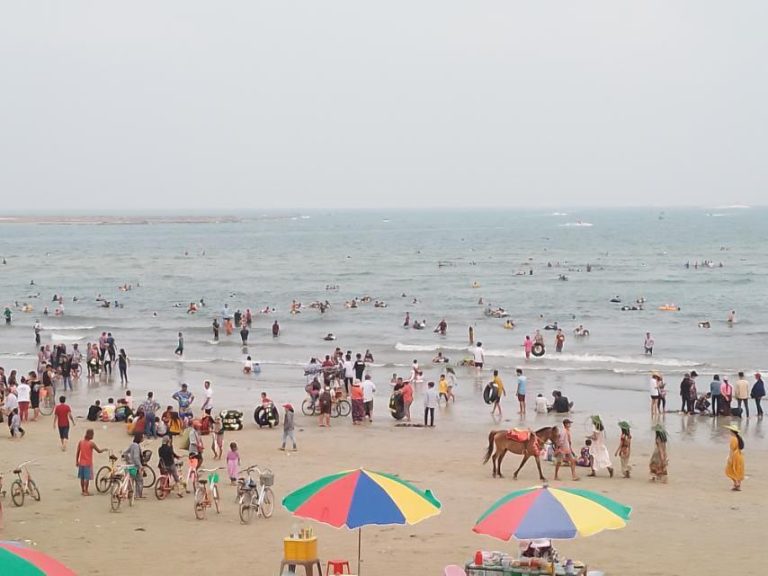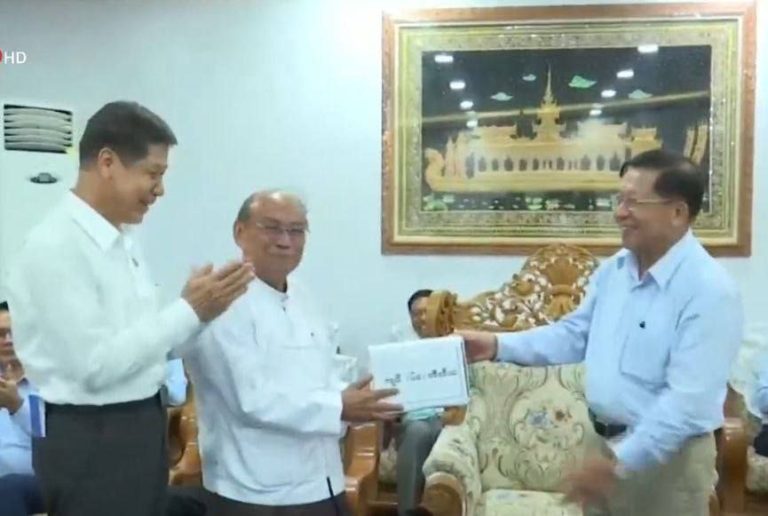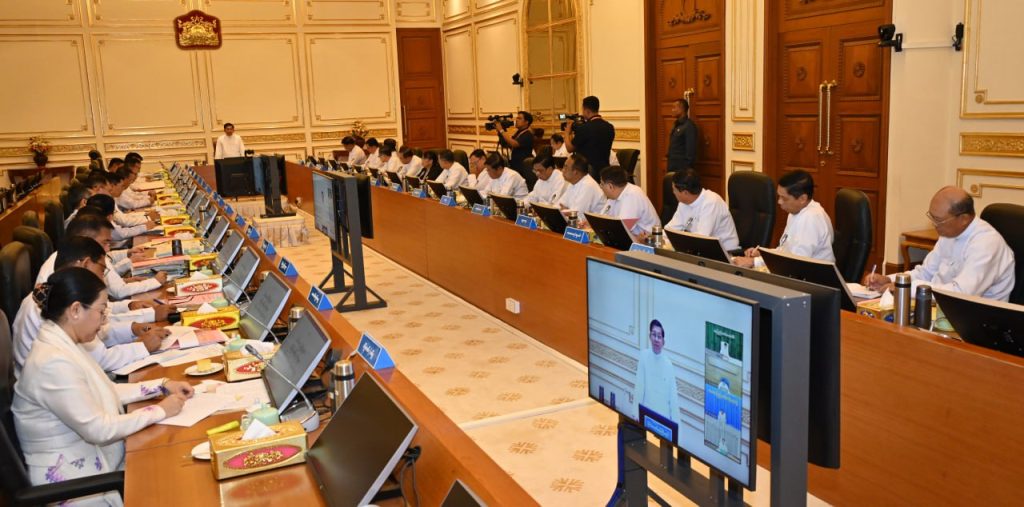
4 December 2024
Chairman of the State Administration Council Prime Minister Senior General Min Aung Hlaing this afternoon delivered an address at the Union government meeting at the meeting hall of the Office of the SAC Chairman in Nay Pyi Taw.
Also present were SAC Vice Chairman Deputy Prime Minister Vice-Senior General Soe Win, union ministers, union-level dignitaries and officials, the Nay Pyi Taw Council Chairman together with chief ministers from regions and states through video conferencing.
Implementation of roadmap and objectives for development of the nation development of the nation
First, the Senior General delivered an opening speech, saying that the SAC is implementing the Roadmap and objectives for the development of the nation. The five-point Roadmap represent the vision and political aspirations of the State, while the nine objectives are the policies of the State and summarize the duties of the government. These tasks are carried out either directly by government mini stries or implemented directly by the State. For instance, regarding the political directive, “To strengthen a genuine, disciplined multi-party democratic system and to build a Union based on democracy and federalism,” the activities must align with steps that contribute to building a Union system based on democracy and federal system. All regions and states are similarly structured, with responsibilities and authorities delegated at various levels. It is necessary to implement and execute these in a proper and effective manner. Rather than merely carrying out assigned duties based on the state or region, it is essential to actively address what should be done and appropriately implement actions to fulfill those responsibilities.
Similarly, the point ‘‘Priority will be given to the achieving peace as the essence of the state and stabilizing the results of the peace process in alignment with the agreements in the Nationwide Ceasefire Agreement (NCA) to the extent possble” highlights the responsibilities of the Union Government, as well as the actions required by relevant ministries. It also mentions the responsibilities of states and regions, along with tasks to be undertaken by respective departments. If such step-by-step efforts are carried out, the implementation of the political direction related to peace will become more effective. These examples demon strate that each directive carries its own significance and relevance. The Union Government and regional governments are responsible for implementing these directives, and it is necessary to regularly review and assess the success or shortcomings of the tasks carried out.
Need to make utmost efforts to have achieve success in assigned projects
A government is subject to time limitations in carrying out its duties. Therefore, it must successfully fulfill its national responsibilities within the given timeframe. During our government’s tenure, we faced and overcame challenges such as the COVID-19 pandemic and political crises. From those experiences, we must learn lessons and work towards progress. It is evident that economic growth remains slow and needs further improvement. According to the data, it is important not to be content with successes on paper but to ensure actual progress and achievements on the ground. If the data is inaccurate, it could lead to errors in the formulation of development plans for the country. Therefore, economic ministers and planning departments in the states and regions must carefully design realistic and practical plans that genuinely benefit the public. It is essential to thoroughly study and analyze the actual ground situation before implementing plans. Furthermore, the nation’s financial resources should only be utilized in areas that can bring tangible benefits.
Emphasize increased production to decline commodity prices
Regarding the economy, it has been observed that the prices of meat, fish, and basic food commodities are rising. Producers and business owners are urged to sell these basic commodities at reasonable and fair profit margins. By selling larger quantities with smaller profit margins, they can help alleviate the financial burden on the public and contribute to their welfare measures.
It is necessary for the Union level, Regional, and State governments to systematically regulate rising prices. Efforts should be made with genuine intent to ensure fair and appropriate pricing while taking on the required challenges. It is also important to maintain a balance between national income and expenditure. To achieve this, production must be increased without fail to enable greater exports. The goal should be to double the current export levels. Additionally, employment opportunities should be created, and incent-ives should be provided to boost manufacturing industries to further increase production.
It is essential to ensure that sufficient resources are provided to create employment opportunities. Regarding production, efforts must be made to increase output as it is imperative, with “no alternative.” Products must meet quality standards and be marketable. If products are similar, they should be priced competitively; if prices are the same, quality must be superior. By focusing on these two key aspects, success can be achieved. Therefore, Chief Ministers of regions and states, along with relevant ministries, are urged to deliberate and take action accordingly.
The need for accuracy of data
There is a need to emphasize the importance of the accuracy of numerical data. For example, it has been observed that the data on cotton in our country show a surplus, but there is a discrepancy between the data reported for export and the actual data. Similarly, there is an annual increase in rice production, but the quantity of rice exported differs from the reported figures. The data presented by regions and states should be verified by the relevant ministries to ensure that no errors occur in the numerical data. It is essential to ensure that the data presented to government officials aligns with the actual field outcomes and reflects the true situation on the ground.
Development of green zone areas and building a green, thriving future for the nation
Regarding the development of green and sustainable areas, it is necessary to establish Green Zone Areas across regions and states, with relevant authorities being required to take strict action. This is a vital task that must be meticulously managed, as failure to do so could lead to deforestation and climate change in the future. During the last rainy season, tree planting campaigns were carried out, and it is important to continue working to ensure that the planted trees survive and thrive. The government has already invested substantial time, money, and resources in promoting environmental sustainability, so it is essential to maintain and protect these efforts to ensure their success. In addition, tree planting and conservation efforts should be carried out along roadways and railways to ensure the survival of forests. Local administrators and responsible authorities must oversee and enforce these efforts at the regional and district levels. Roadside areas and railway lines should also comply with road laws and railway regulations to maintain order and sustainability. There has been a lack of consistent management in the past, and it is now crucial that the responsible parties act in accordance with regulations and standards to ensure that roadways and rail-way corridors meet established environmental criteria.
Creating a country with productive capacity and expanding employment opportunities
Regarding the issue of labor shortages, it has been observed from the reports of certain employers that approximately 70 percent of the country’s population resides in rural areas, and around 50 percent have limited educational qualifications. Around 41 percent of the population is employed in agriculture, forestry, and fisheries. Therefore, it is crucial for us to create employment opportunities based on agricultural production in the current context. In countries with large populations with millions of people, the number of citizens working abroad may not be immediately visible, but it is noticeable that in countries with smaller populations, like ours, the trend has decreased significantly. As the available workforce decreases, it is necessary to ensure that people can access suitable employment opportunities with fair wages. Thus, it is important to create job opportunities in each region and state to promote local development. If the production capacity increases and supply and demand can be balanced, it will be possible to control commodity price inflation. This, in turn, can lead to improved exports, higher revenues, and a potential decrease in currency inflation.
Domestic oil consumption security
Regarding oil security, it has been emphasized that since 2021, 41 times have been raised regarding this issue. The economic policy also includes the objective of “Promoting the cultivation of oil crops to ensure domestic oil security, and working towards achieving the target goals, so that the country can not only achieve domestic sufficiency but also export oil.” However, it has not yet been possible for us to ensure domestic consumption security. Concerning oil crops, it has not been possible to achieve the target goals, and therefore it is necessary to systematically find solutions and take actions to ensure success. If we seek and implement the right methods, success will be achievable. It is crucial that people are at the forefront, and the management and leadership of the people are of paramount importance.
Need for consensus in implementing new projects
Regarding the implementation of new projects, it is important to emphasize that generally, a consensus must be reached before proceeding with these projects. If the projects benefit the country, permission will be granted, and they should be completed within the specified timeframe. During the period of responsibility, only projects that can be effectively completed should be pursued, and it is essential to take responsibility for ensuring the successful completion of these projects.
Concerning the ministries involved in economic activities and production, while there are ministries that can generate profits, there are also those that have not achieved success. It is necessary to continue supporting those projects that benefit the country, while also reassess ing and halting those that cannot generate profit. Regarding state-owned enterprises, the goal is to ensure they are beneficial and to encourage sound economic practices.
Then, the chairman of Nay Pyi Taw Council and chief ministers of regions and state who were attending the meeting reported to the Senior General on matters related to education, health, agriculture and manufacturing tasks.
Additional instructions given
After hearing the reports, the Senior General said it was found that agriculture and livestock products are distributed to the people at reasonable prices and rice sufficiency percentages were also reported. Not only the government but also everyone must exert effors for food security in respective regions and states. If food security ensured in regions and states, there will be no reason for rising basic food prices. Therefore, it is necessary to place emphasis on sufficiency of basic foodstuffs.
In connection with education, it is necessary to enable all school-aged children to go to school and study, to maintain full percentage passing rates, to take measures to allow all students to take examinations and to open schools safely. As primary and middle school teachers are first teachers for students, they are required to be competent. Steps will be taken to open polytechnic universities in respective regions and states.
As for the economy, industries based on cotton and bamboo must be established. As bamboo raw materials are abundantly available in regions and states, it will be beneficial for them to establish paper and pulp industries based on bamboo and it will also save foreign exchange spending of the country. In relation with rubber production, efforts must be made to pro duce rubber raw materials as well as rubber finished products. Regions and states, where onions are cultivated, are required to expand onion acreage for exports as there are markets for the crop near the country. Ministries, regions and states are urged to fully collect taxes to ensure more spending for the country and the people.
Then, union ministers reported to the Senior General on their relevant sectors.
Afterward, the Senior General made concluding remarks by urging participants to make efforts to organize the upcoming national sport festival in accordance with its essence and to improve the sport standards in respective sports.
Similarly, a meeting of the National Economic Committee of the Republic of the Union of Myanmar was held at the meeting hall of the Office of the Chairman of the SAC this morning.

